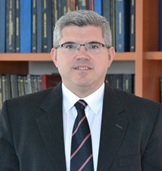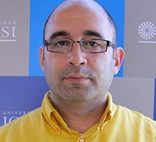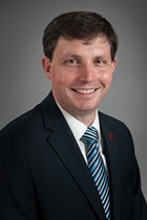Wednesday, Nov 16th
Heterogeneous V2X Networks for Connected and Automated Vehicles
Connected vehicles will rely on V2X communications to improve traffic safety and management. V2X communications can also facilitate the development of cooperative driving and sensing applications for automated vehicles. The automotive industry is currently working to deploy connected vehicles that will initially rely on the IEEE802.11p/ITS-G5 standard. At the same time, the cellular industry has started the evolution of 4G LTE standards to integrate V2X communications, and has identified the automotive sector as one of the key verticals in the development of 5G. A massive deployment of connected and automated vehicles demand the capacity to provide reliable, scalable, and low-latency V2X communications. Providing such levels of quality of service is a challenge, and this keynote will discuss the need, opportunities and challenges for heterogeneous V2X networks to support connected and automated vehicles.

Javier Gozalvez, Professor at Universidad Miguel Hernandez de Elche (Spain), and President of the IEEE Vehicular Technology Society
Javier Gozalvez received an electronics engineering degree from the Engineering School ENSEIRB (Bordeaux, France), and a PhD in mobile communications from the University of Strathclyde, Glasgow, U.K. Since October 2002, he is with the Universidad Miguel Hernández de Elche (UMH), Spain, where he is currently an Associate Professor and Director of the UWICORE laboratory. At UWICORE, he leads research activities in the areas of vehicular networks, multi-hop cellular networks and D2D communications, and wireless industrial networks. He has published over 130 papers in international conferences and journals. He has received several awards at international and national conferences, the best research paper award from the Journal of Network and Computer Applications (Elsevier) in 2014, and the Runner-up prize for the “Juan López de Peñalver” award of the Royal Academy of Engineering in Spain that recognizes the most notable Spanish engineers aged below 40. He is an elected member to the Board of Governors (2011-2016) and 2016 President of the IEEE Vehicular Technology Society (IEEE VTS). He was an IEEE Distinguished Lecturer for the IEEE VTS, and currently serves as Distinguished Speaker. He currently serves as Mobile Radio Senior Editor of the IEEE Vehicular Technology Magazine, and on the Editorial Board of the Computer Networks journal. He was the General Co-Chair for the IEEE VTC-Spring 2015 conference in Glasgow (UK), ACM VANET 2013, ACM VANET 2012 and ISWCS 2006, and TPC Co-Chair for 2011 IEEE VTC-Fall and 2009 IEEE VTC-Spring. He is a regular expert reviewer for the European Commission and national research agencies around the world.
Millimeter waves challenges for 5G
Spectrum bands above 6GHz are of huge interest for the deployment of 5G. In recent years, many publications about the characteristics and challenges of different mm bands have been published. In this talk, we will revise some of the main aspects of the propagation and channel behavior of bands above 6GHz and the challenges to use it successfully in 5G. We will discuss about propagation losses, MIMO and diffuse scattering, as well as some concepts of heterogeneous networks combining mm bands for high capacity with below 6GHz bands for coverage.

Andres Navarro Cadavid
Dr Andres Navarro is an Electronic Engineer (1993), with a Master on Technology Management (1999), both from Universidad Pontificia Bolivariana in Medellín. Dr Navarro obtained his PhD in Telecommunications from Universitat Politécnica de Valencia in 2003. He is IEEE Senior Member, advisor of the Spectrum Management Committee for Colombian Spectrum Agency and ITU expert. Dr Navarro is a participant on COST Action CA15104 IRACON and former actions COST IC1004 and COST 2100. Director of the i2t research group at Universidad Icesi since 1999. His research interests are Spectrum Management, mobile radio planning, radio propagation and m-health.
Thursday, Nov 17th
Economic Principles for Future Internet Architecture

Tilman Wolf, Professor of Electrical and Computer Engineering and Associate Dean of Engineering at the University of Massachusetts Amherst. Distinguished Lecturer IEEE Communications Society
Tilman Wolf is Professor of Electrical and Computer Engineering and Associate Dean of Engineering at the University of Massachusetts Amherst. He received a Diplom in informatics from the University of Stuttgart, Germany, in 1998. He also received a M.S. in computer science in 1998, a M.S. in computer engineering in 2000, and a D.Sc. in computer science in 2002, all from Washington University in St. Louis.
Dr. Wolf is engaged in research and teaching in the areas of computer networks, computer architecture, and embedded systems. His research interests include Internet architecture, network routers, and embedded system security. He was lead principal investigator on the ChoiceNet project, one of five large NSF Future Internet Architecture (FIA) projects. He is co-author of the book “Architecture of Network Systems” and has published extensively in peer-reviewed journals and conferences. His research has been supported by grants from NSF, DARPA, and industry. He has taught numerous courses on computer networks, embedded systems, programming, and digital design.
Dr. Wolf is a senior member of the IEEE and the ACM. He is an IEEE Distinguished Lecturer. He is steering committee member and past chair of the IEEE/ACM Transactions on Networking and past associate editor for IEEE Micro. He has been active as program committee member and organizing committee member of several professional conferences, including IEEE INFOCOM and ACM SIGCOMM. He has served as TPC chair and general chair for ICNP 2013, ANCS 2011 and 2012, and ICCCN 2009 and 2010. He served as treasurer for the ACM SIGCOMM society from 2005 to 2013. At the University of Massachusetts, he received the College of Engineering Outstanding Junior Faculty Award in 2006, the College of Engineering Outstanding Teacher Award in 2008, and the IEEE/HKN Student Branch Outstanding Faculty Award in 2010.


